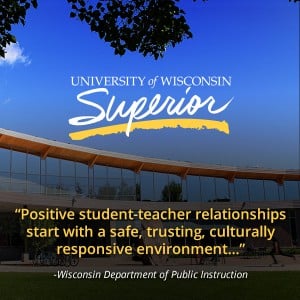
A positive student-teacher relationship is one of the most important aspects of effective education. Although the importance of building positive connections applies to all student-teacher relationships, it may be even more important in special education. A teacher who thoroughly understands a student, both their strengths and weaknesses, is better suited to tailor that student’s education to their unique needs. And a teacher who strives to know and respect a student’s culture, life and background can better understand the context of that student’s behaviors and learning styles.
Building on the foundation of a positive relationship and teaching students in a way that capitalizes on their abilities, strengths and experiences can help improve their learning and achievement. In turn, this can foster improved student self-confidence, leading to continued learning and success. Through coursework and internship-based clinical study, graduate degree candidates enrolled in programs such as the University of Wisconsin-Superior’s online Master of Science in Education in Special Education have the opportunity to study the importance of the student-teacher relationship and learn strategies to develop better connections with the students who need it most.
How Do Educational Systems Incorporate the Student-Teacher Relationship into Their Educational Design?
To support the positive connection between students and teachers, most school systems and state education agencies focus on this as integral to their educational design and mission. For instance, the Wisconsin Department of Instruction (DPI) includes the student-teacher relationship as a main facet of “Promoting Excellence for All,” outlining many strategies of building this connection. In their belief statement, the DPI states the following:
We believe positive student—teacher relationships start with a safe, trusting, culturally responsive environment in which both students and teachers are empowered to have open conversations, share personal information, and create authentic connections to foster long-term relationships beyond the classroom.
Open conversations about race, ethnicity, disabilities, and other modes of cultural competence should be infused into the classroom. We create a safe place to hear students’ experiences and voices and that builds trust.
How Does the Student-Teacher Relationship Apply to Special Education?
As noted in the DPI’s belief statement on the student-teacher relationship, teachers build authentic connections by fostering a trusting, supportive environment, valuing and understanding a student’s abilities and cultural background, and incorporating that understanding into a classroom that empowers students.
In particular, students with disabilities face substantial challenges succeeding in school. These challenges surface through their inability to achieve by traditional academic standards, rooted in differences in learning styles and needs. Therefore, the need to deeply understand each student’s abilities and disabilities and differentiate instruction accordingly is especially applicable in both special education classrooms and inclusive classrooms. To fully grasp how each student can best learn, a teacher needs to know that student well and have genuine empathy for him or her. Understanding a student’s background, interests and social life are equally as important as understanding their cognitive or physical abilities and disabilities. Developing a positive relationship with students is essential to building this genuine empathy and understanding.
Moreover, students with disabilities often have a history of low expectations and low levels of achievement, causing them to internalize an inability to succeed. This learned helplessness can result in many behavioral problems in the classroom — both negative social behavior based in insecurities and low self-confidence and negative academic behavior rooted in the “born to fail” mentality. To address this, high expectations and positive reinforcement of achievement and behavior can illustrate the teacher’s belief in the student’s abilities and potential. Discipline or behavior correction is necessary at times too, but is best handled in private, allowing the student to process their behavior and how they can improve it.
Through developing strong relationships with students, teachers can help reverse this self-defeating pattern of negative thought. When students are given the tools they need to succeed, coupled with the knowledge that teachers believe in their abilities, they can develop a better sense of self-confidence.
What Are Some Strategies for Building Better Connections With Students?
There are many ways to improve your relationship with students, but at the heart of all of them is this: Get to know each student. Everyone has a unique story, so ask your students about theirs and incorporate their experiences into the classroom. This can mean using reading and visual materials relevant to the student’s cultural experience, language and history. It can take the form of educational apps on the iPad to engage a learner who has difficulty with oratory skills but loves technology. It can be almost anything that integrates student interest and ability with their learning.
Differentiation is common practice in inclusive and special education classrooms, but it too often depends on adapting to each student’s disabilities. Modern educators are starting to focus on what is known as “neurodiversity,” basing engagement on the diversity of student abilities and strengths instead of their disabilities.
Clearly, the student-teacher relationship is essential to effective special education. If based in genuine care for the student, teachers can develop this connection in many ways. Getting to know your students’ unique interests, abilities and strengths can help you effectively engage each student in their education. And through creatively using knowledge and understanding gained from a strong relationship, the teacher can help each student overcome their disabilities and build upon their strengths, setting them up for both behavioral and academic success.
Learn more about the UW-Superior online MSE Special Education program.
Sources:
Middle Web: Building Rapport with Inclusion Students Requires Extra Steps
Wisconsin Department of Public Instruction: Student-Teacher Relationships
Education Week: 7 Ways to Bring Out the Best in Special-Needs Students
Association for Middle Level Education: Developing Relationships with Difficult Students
National Education Association: 5 Tips for Better Relationships with Your Students


